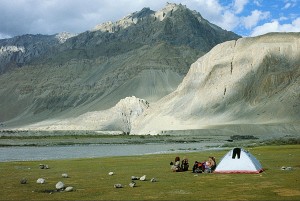Alaska Dispatch has a nice piece by Deanna Neil on the integration of technology and our experience of nature. Truth be told, that integration has been going on for centuries, since an ink-stained printer using movable type chunked out the first backpack-sized plant and wildlife identification books. And books are just the smallest bit of how our enjoyment of the outdoors has been enabled and enhanced by the technology. Think here of sleeping bags and Kevlar canoes and freeze-dried stroganoff.
The difference today is connectedness: how much are you on your own in wilderness, out of touch with that blinking, buzzing web of data that is your normal life? How much should you be disconnected? Is disconnectedness why you are out there, or is it just a relaxing byproduct? And…here is the crux…is connectedness inevitable? Isn’t it just a matter of time before you can get texts on a family crisis or call for help while you are deep in the Quetico?
Neil argues against this fate, in favor of another kind of connection that we are often too distracted to notice: “It is a beautiful idea that human beings might collectively decide to create sanctuaries away from the world of technology; where connection can be considered equally as strong through the fibers of the earth as it is through data in the air; where we can teach kids how to put down Angry Birds for five minutes and look around; where we can go to learn of the darkness. The quiet. The loneliness. The awe. The last sliver of a reminder of what was.”
Sounds great. Also unlikely. Inevitably, we will make it cheap and easy to bounce signals off satellites or the moon from any place on earth. And just as inevitably, some people will abuse that power. They will be plugging in from the back of beyond.
What we need is a consensus on how to minimize the impact their technology has on my experience. I don’t want to hear them braying into a smartphone while I’m cooking over a wood fire on the opposite side of the lake. I don’t want to see the sickly blue light from their tablet while I’m stargazing.
There’s reason for optimism. People know enough to pack out what they’ve packed in. They don’t bring boom boxes deep into nature. They can learn this, too.
Photo: Wilderness camping on the bank of Zanskar River (1991) by JP Hamon, via Wikimedia Commons










